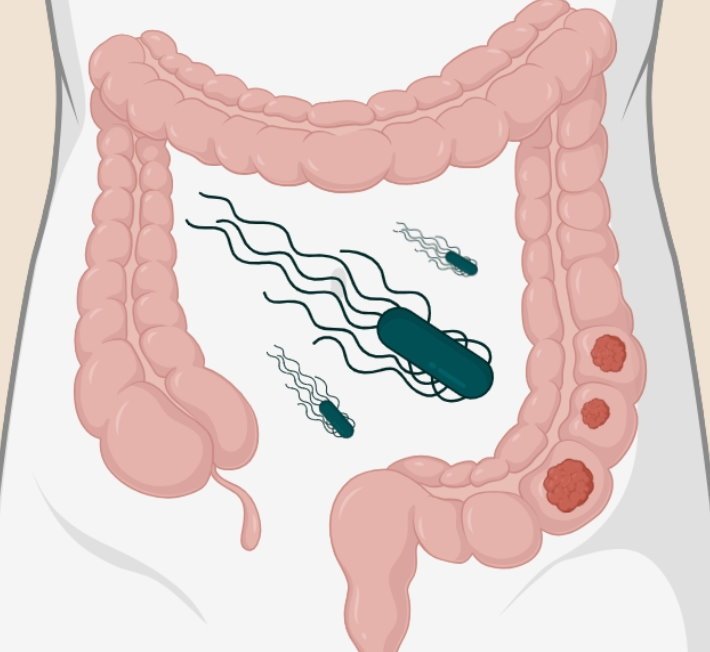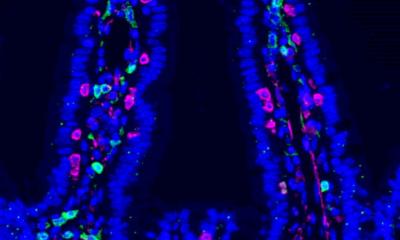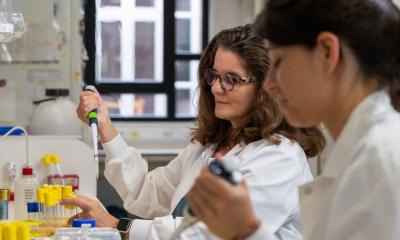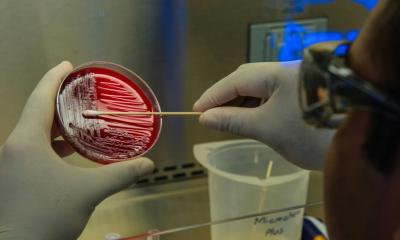
Image source: LUMC
News • Bacterial-induced host metabolic shift
How Salmonella can lead to colon cancer (and how it may be stopped)
When Salmonella enters a body, in some cases it can infect cells in the intestines. Sometimes these bacteria cause serious infections, even fatal ones in rare cases. But most Salmonella infections are not serious. In fact, most people do not even realize that their mild symptoms of food poisoning are caused by Salmonella.
In 2022, researchers at the Leiden University Medical Center (LUMC) discovered that Salmonella sometimes does more than just make people temporarily sick: it can disrupt the behavior of the human cells and contribute to cancerous growths. The same scientists have now succeeded in unraveling the biological mechanism behind this process. The new study was published in the scientific journal Cell Reports.

Image source: LUMC
It all revolves around a protein complex located in our cells called mTOR. This protein helps the cell decide what to do based on available energy and nutrients. You can think of mTOR as the central regulator in the cell. The protein ensures that metabolism (the process by which a cell converts substances into energy) and cell growth and division occur in a controlled manner.
The researchers found that when Salmonella infects a cell, the bacteria use nutrients from that cell to multiply. This disrupts the normal balance present in the cell, and mTOR becomes severely dysregulated. As a result, the cell becomes cancerous: the cell grows faster and begins to divide uncontrollably. “What is striking is that even when the bacteria are gone, the cell remains in a cancerous state. This increases the chances of forming tumors,” says Dr. Virginie Stévenin, who coordinated the study together with Prof. Dr. Jacques Neefjes.
The good news is that the scientists may also have found a solution to this problem. "We discovered a way to influence the multistep process of cancer formation with a previously discovered inhibitor, a substance (inhibitor) that can temporarily block the action of mTOR. After a while, we saw that this caused the cells to return to their normal state. Our laboratory research suggests that there is a way to reverse the harmful effects of Salmonella infection", Stévenin explains.
Even though she adds: "These findings remain to be tested in complex pre-clinical models to see if the inhibitor will also work on more advance stage of tumor formation. As such mTOR inhibitors are already used in clinical trials for cancer treatment, they could be used in the future as most effective treatment for colon cancer induced by Salmonella infection, and maybe from other bacteria as well."
Salmonella can roughly be divided into two types:
- Salmonella causing typhoid fever
This type infects only humans and occurs mainly in low-income countries in Africa and Asia. An estimated 20 million people worldwide are affected annually, resulting in about 200,000 deaths. - Non-typhoid Salmonella
This strain can infect both humans and animals and is the most common. Although less deadly, this form causes about 150 million infections and 60,000 deaths worldwide each year. This type of Salmonella is the focus of this study.
Prevention
Good kitchen hygiene and thorough heating of meat, fish, eggs and shellfish until fully cooked are the most important precautions to prevent Salmonella infection.
The study highlights how important it is to take bacterial infections seriously, even if they cause only mild symptoms. For example, food poisoning from Salmonella can increase the risk of colon cancer. This type of research simultaneously offers clues to preventing and treating cancer by intervening in the biological process.
Source: Leiden University Medical Center
05.01.2025










